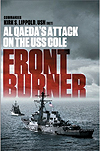
Front Burner: Al Qaeda’s Attack on the USS Cole, by Kirk S. Lippold, PublicAffairs Books, 2012, $27.99
Commanding officers of U.S. Navy ships have wide latitude in how they lead their vessels. Two elements of command, however, are chiseled in stone: absolute authority and absolute responsibility.
For more than a decade critics—some of them family members of the 17 sailors killed when a terrorist suicide bomb boat in Aden, Yemen, struck Commander Kirk Lippold’s guided missile destroyer USS Cole in October 2000—have pointed to those tenets in blaming Lippold for security lapses that allowed the attack to occur.
At the beginning of this personalized account of that attack, author Lippold duly shoulders blame for various command shortcomings, writing, “I do not wish to minimize or excuse my own failure as captain to prevent this tragedy.”
But Lippold’s detailed and readable retelling of the attack and its aftermath goes to great lengths to emphasize high-level Navy and Pentagon findings that the ship was well-led, conclusions underlined by his subsequent selection for promotion to captain. Senator and former Secretary of the Navy John Warner opposed the promotion, believing Lippold should be held accountable for the attack. Lippold faults several senior leaders, including onetime mentor Rear Adm. John Miller and two secretaries of the Navy, for failing to support his unsuccessful four-year effort to gain that promotion.
Lippold also criticizes senior individuals he encountered during and after the attack. His account of U.S. Central Command commander Army General Tommy Franks coming aboard after the attack and, while touring the damaged ship with bodies of victims still trapped in the wreckage, shaking sailors’ hands and handing out command coins “like he was on some walking tour of an Army base,” would be darkly humorous if not so, as Lippold puts it, “disconnected from reality.”
All told, Front Burner is a cleanly written if sometimes less than flowing narrative. It’s an earnestly told tale of bravery and determination. It provides gripping detail about the Cole attack—much of it not previously revealed—as well as its grisly aftermath, when the destroyer nearly became the first Navy ship sunk in a combat theater since 1952 (when the fleet ocean tug USS Sarsi went down after striking a North Korean mine). And it opens a pre-9/11 window into the government’s failure to share intelligence with those most in need of it.
Lippold saves his most generous words for his crew’s magnificent performance in casualty assistance and damage control during the days following the attack, when the flooding of two of the ship’s engine rooms threatened to sink it. His pride in the crew’s performance is palpable.
—William H. McMichael




